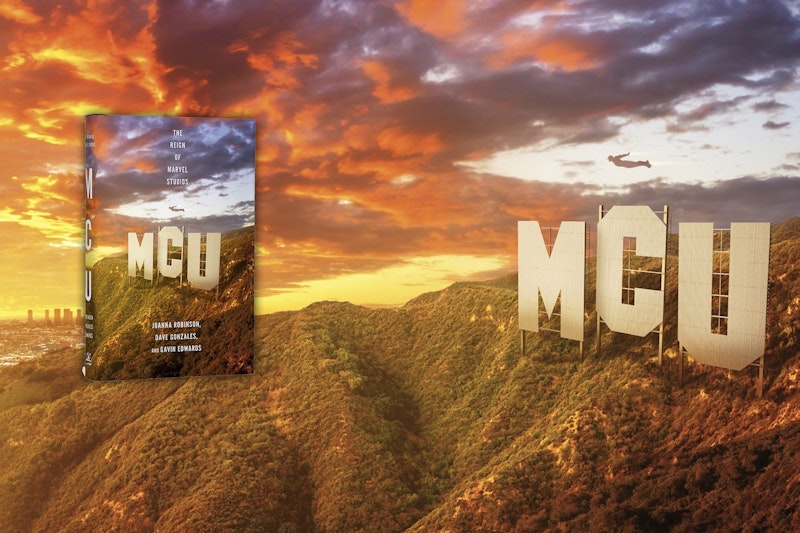I never saw Iron Man. 2008 was a long ways away from 2002, when I saw Sam Raimi’s Spider-Man six times. Like I wrote last week, my comic book phase only lasted a few years, and in the very early-2000s; I consider myself lucky to have been in the rarefied demographic of Star Wars: Episode I — The Phantom Menace (six-years-old), and even more so to enjoy Bryan Singer’s X-Men in 2000. I didn’t get the hype over X2 three years later, and I saw Spider-Man 2 just once. In the new book MCU: The Reign of Marvel Studios, Marvel’s Supreme Commander Kevin Feige refers to Raimi’s 2004 sequel as “the blueprint” for all films in the Marvel Cinematic Universe.
That’s not why I avoided Iron-Man or The Incredible Hulk in 2008—I never saw those movies because those characters suck. Ang Lee’s 2003 Hulk—the first movie I saw in Baltimore, the first time at The Senator—was a dour mess, but after reading MCU, I’d like to revisit it. The book is co-authored by Joanna Robinson, Dave Gonzales, and Gavin Edwards, and they repeatedly characterize the early-2000s superhero movies as “for 20-year-olds” and “dark.” Christopher Nolan’s Dark Knight trilogy is hardly mentioned, a bizarre omission in a book largely favorable not only to Marvel’s style but its emphasis on uniformity. Nolan’s films are too good to exist alongside anyone else in any DC “Dark Extended Universe” or whatever; Jon Favreau directed the first two Iron Man movies and Shane Black did the third, but otherwise, this is a studio that likes company men.
The authors never question Feige’s insane claim that the MCU has “enough stories” to last for 100 years. I don’t think they had enough with Iron Man. Marvel sold its most valuable characters and properties off in the 1990s, and the book details the company’s ascent from the ashes even as companies like Sony and Fox retained ownership Spider-Man and the X-Men, respectively. That Madame Web fiasco in theaters now? That’s a Sony production, not Marvel. Have you ever wondered why the X-Men never wear their bright suits, Wolverine in yellow, in the movies? It’s all so silly.
Reading MCU was a much better way to catch up on the MCU than actually watching any of the films, most of which sound dreadful and look even worse. Everyone knows Marvel works their VFX and post-houses to the bone and right up to deadline, and now, with boom mics in Madame Web, more and more people are finally exhausted of the spandex barrage of the last decade. I’m so glad it’s almost over—reading the book, I remembered how far I checked out, totally unaware there were four Avengers movies, and just as many for Thor. The fourth one was playing across the street in Westwood when I saw Rise of Gru in 2022. Between those two? There’s no choice.
The book never questions what the collapse of Marvel will look like, and although it does get into the recent superhero exhaustion, the authors paint this as a temporary roadblock exacerbated by the pandemic and a series of unforced errors by people like James Gunn, Joss Whedon, and Jonathan Majors.
But what’s troubling about the book is the authors never once question whether or not Marvel’s dominance of the marketplace was a good thing. It’s implicit that great superhero movies were a long time coming and Marvel and Feige deserve to reign as long as possible. The book is “unauthorized,” but they talk to all of the main players and many other people, and it goes into the production of each MCU movie, many at length. They mention that filmmakers like Chloé Zhao and Lucrecia Martel were put off by the studio’s methods, but there’s zero discussion about the appeal of superhero movies. At the start, it’s painted as September 11, 2001 and War in Iraq “comfort food,” but as we all know, the MCU didn’t really take off until the 2010s, and even then with Guardians of the Galaxy in 2014 (Feige and Robert Downey, Jr. agree that Guardians is “the best MCU movie” because it proves Feige’s theory that no character or story is inherently less interesting than another in Marvel’s roster).
Donald Trump hardly comes up, but I guess that’s why Avengers: Infinity War and Avengers: Endgame did so well back-to-back in 2018 and 2019 (more “comfort food” for “the Resistance?” Or just an increasingly bored and stupid audience?). The bong that is Marvel has been cashed, and America needs a new distraction.
Enter another MCU: Mattel…
—Follow Nicky Otis Smith on Twitter and Instagram: @nickyotissmith

